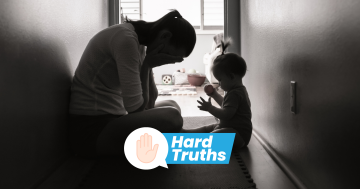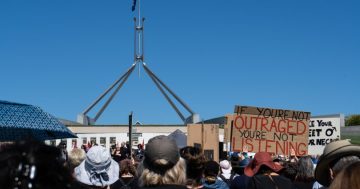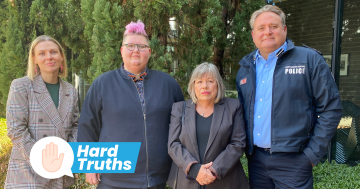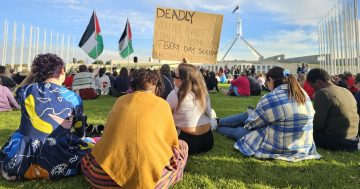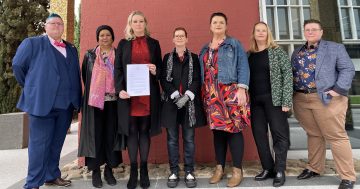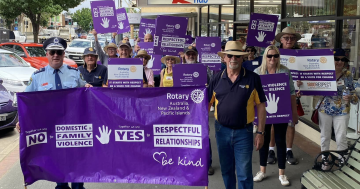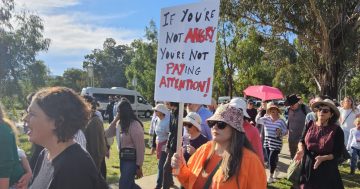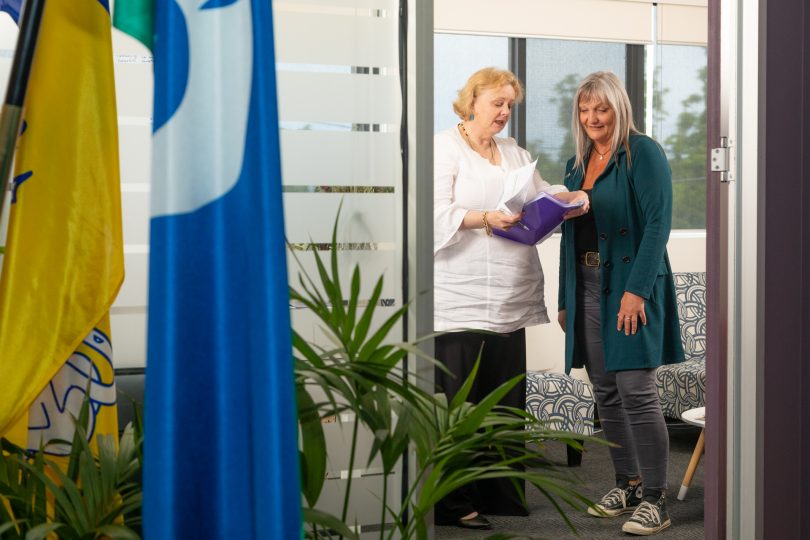
Interim general manager at DVCS, Glenda Stevens explains the impact of domestic and family violence within the Canberra community. Photo: Michelle Kroll.
One-in-six women in Australia have experienced physical and sexual violence by a current or former partner since the age of 15, while one-in-four women have experienced emotional abuse.
The statistics shared by Canberra-based not-for-profit Domestic Violence and Crisis Service (DVCS) reveal a grim reality.
DVCS experienced a 310 per cent increase in anonymous callers in April 2020 compared to March (anonymous callers tend to be people calling for the first time), and there was a 38 per cent increase in online engagements from January to July this year as compared to the same period in 2019.
Glenda Stevens, interim general manager at DVCS, said that domestic violence has a huge negative, physical and emotional impact on the person subjected to violence.
“It is a range of abusive and controlling behaviours that can be physical and non-physical making a person feel fearful, intimidated and often helpless. It’s a pattern of behaviour that limits independence. It establishes and maintains a deliberate imbalance of power,” Ms Stevens added.
The situation worsened during the COVID-19 lockdown period and the incidents of domestic violence were “more intense and frequent”.
“A large number of people contacted us during COVID lockdown period. Traditionally, 95 per cent of our contacts come directly through our crisis line but during that period, people didn’t feel safe enough to make a phone call and instead contacted us by email, SMS, online chat and social media. There was 47 per cent increase in that form of contact from March to August 2020,” she said.
Now, DVCS and Australian National University’s Respectful Relationships Unit are coming together to host four online training session during the 16 Days of Activism Against Gendered Violence global campaign which runs from 25 November to 10 December. The training sessions will be held online from 30 November until 9 December and will provide information on Being a Bystander, Domestic and Family Violence, Responding to Disclosure and Sexual Assault.
“Unfortunately, domestic violence is still occurring across all strata of our community. It could be the family next door, a cousin or someone at school. The online training is for those who want to learn more about what they can do when they don’t feel safe and how they can live a life free of fear and violence,” she added.
From 25 November to 10 December, DVCS will also share interviews on Facebook with 19 women living and working in the ACT who will share their work and what they are doing to help prevent violence against women.
The ANU Respectful Relationships Unit was established in January 2019 to provide a safe and respectful campus for the ANU community and create a community which is free from violence, particularly sexual assault and harassment.

ANU Respectful Relationships Unit senior manager Sue Webeck says the 16 Days of Activism campaign is a great way to highlight the need for community action and change. Photo: Supplied.
Senior manager Sue Webeck said the 16 Days of Activism campaign is a great way to highlight the need for community action and change.
“We are partnering with DVCS to present four bite-sized education and engagement opportunities for our community. Through the four training sessions, we are hoping to be accessible to a broad range of our community members and start a baseline conversation about how we, as a community, may be able to respond better and count ourselves into being a change to stop family domestic intimate partner violence and ensure that we are able to respond to those who need care and support,” she said.
“It is also a good opportunity to highlight work that has been done to prevent violence and ensure that people have accurate information about where they can get help and support.”
For those seeking help, Sue Webeck advises them to reach out to a large sector of qualified professionals who can provide the care and support that they deserve.
“DVCS is a good example of that. It also exists as a service for you, as a community member, to call and explain a situation someone is facing and tell them that you don’t know what to do and they will provide support and respond on what to do,” she added
The video interviews with women who work to promote the elimination of violence against women will be shared on DVCS’ Facebook page from 25 November to 10 December.
Online training with the ANU Respectful Relationships Unit is running from 30 November to 9 December. Sign up here.













